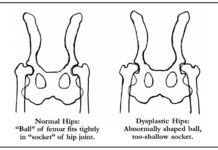Colitis: An Urgent Problem
Conventional medical practitioners use the word colitis to indicate inflammation of the colon (the large intestine), as opposed to inflammation of the small intestine or the stomach. One of the large intestine’s most important roles is to absorb water. If the colon is not functioning properly, a lot of water is left in the stool; that’s diarrhea. There are many different types of diarrhea, and, unpleasant as it may be to contemplate, the characteristics of the diarrhea help us identify which part of the dog’s digestive system is not working properly.
Can Meat Cause Kidney Failure?
CA 94501; or fax to (510) 749-4905
Helping Dogs With Hip Dysplasia
First, I need to make it clear that there are many types of rear end lamenesses that may end up being diagnosed as hip dysplasia, but you really can't accept the diagnosis of hip dysplasia without hip x-rays. Hip dysplasia is a radiographic diagnosis, not a clinical diagnosis. That may be splitting hairs, but I see many dogs with conditions such as ruptured and improperly healed cruciate ligaments or lower back arthritis that have been diagnosed with hip dysplasia. Only radiographs can determine whether or not a dog has hip dysplasia.
Canine Diabetes, A Common Yet Serious Problem
Diabetes is a common and serious problem in pets. Formally known as diabetes mellitus (the sweet sickness), it’s a disorder of the pancreas gland. The pancreas produces a hormone called insulin, whose purpose is to drive nutrients, specifically glucose, or blood sugar, into the cells. It’s the body’s most important fuel molecule. Good management is the key to longevity for diabetic dogs.










